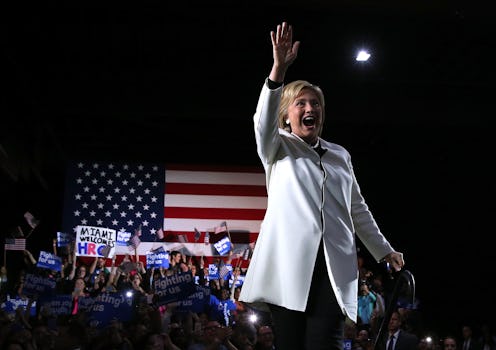News
It's Still A Close Race With These Delegate Counts
In the wake of an exhilarating Super Tuesday, the race for the party presidential nominations looks a little different, but not too much. The Super Tuesday delegate counts show, as expected, that Hillary Clinton and Donald Trump came out on top of the Democratic and Republican primary contests, respectively, furthering their pushes toward the nominating conventions in July. But Super Tuesday ended up being a lot less Super than usual, in that no one truly blew the rest of the competition out of the water. Clinton and Trump may have established more ground as their parties' frontrunners, but neither really dazzled in the delegate count. The good news for political junkies is that this means the race is still far from over.
For the Republicans, it’s truly anyone’s game, as long as your name is "Donald Trump," "Ted Cruz," or "Marco Rubio." Each of the top three candidates has a fair share of impressive endorsements and is still within range of earning enough delegates to become the party's nominee. John Kasich and Ben Carson are too far behind to catch up (and Carson will likely drop out soon), but three candidates is still enough to keep things interesting until July.
Among the Democrats, Clinton was on fire Tuesday night, but the majority of the states she won don’t have a prayer of going Democrat in the general election. That could be a really important consideration when superdelegates make their final decisions later on in the nominating process. Super Tuesday asked more questions than it answered, and the state of the race feels more uncertain than ever. Here are the updated post-Super Tuesday delegate counts for each candidate.
Hillary Clinton
Clinton came out on top in the Democratic race, increasing her delegate count from 97 to 577. Of the 12 Democratic contests, Clinton won eight, including the primary in American Samoa. When you factor in superdelegates who have pledged to support, she's just under halfway to the 2,382 delegates needed to secure the Democratic nomination. If anyone could be considered a lock, it's Clinton.
Bernie Sanders
Sanders didn't fare as badly as expected. He'd won four states by the end of the night, and increased his delegate count from 65 to 386, less than 200 away from Clinton. He even managed to shut out his rival in his home state of Vermont, where Clinton didn't pass the 15 percent vote threshold to be eligible for any delegates. Yet despite this better-than-expected performance, he's still quite far off from the necessary delegate count to become the nominee at the convention in July. If all the remaining superdelegates pledge to Sanders, he's still got a chance, but they might not come in until the very last minute.
Donald Trump
Trump finished Super Tuesday just as expected, winning nearly every state and ceding only Texas and Oklahoma to Cruz and Minnesota to Rubio. His delegate count jumped from 82 to 319, although the increase wasn't as much as his campaign had anticipated, and it was far from the blowout win that his supporters were hoping for.
Ted Cruz
Cruz was perhaps the biggest winner of the night among the Republicans. He managed to bring his delegate count up from just 17 to 226, largely thanks to the big win in his home state of Texas which netted him 99 delegates. His final total puts him within 100 delegates of Trump, a feat which many didn't expect him to accomplish. Cruz could conceivably still pull ahead to become the party nominee. Only time will tell.
Marco Rubio
The night wasn't a total bust for Rubio, even though he looked completely defeated. He managed to pick up 94 delegates, thereby increasing his count from 16 to 110, thanks to a statewide win in Minnesota and a tantalizingly close second-place finish in Virginia. This might be the beginning of #Marcomentum — the race is really still wide open (at least for the top three candidates), and with the Republican establishment behind him, Rubio can't be counted out quite yet.
John Kasich
Kasich is still doggedly hanging on to his hopes for the White House, and Super Tuesday actually wasn't as bad for him as it could have been. He got second place behind Trump in Massachusetts and Vermont, echoing his success in New Hampshire due to similar regional politics. Overall, Kasich's delegate count increased from six to 25, and since he contends that a strong Super Tuesday performance was never in his "game plan," his meager winnings seem to be enough to sustain him, at least for a little bit longer.
Ben Carson
Poor Ben got three delegates from Virginia, but other than that, Super Tuesday was a huge bust for the retired neurosurgeon and one-time party frontrunner. With only seven total delegates now, paltry even compared to fourth-place Kasich, Carson staying in the race would be just short of masochism. He's had long-term problems with his campaign that haven't been resolved by major staff changes, and stagnant fundraising is about to eliminate any future for him, regardless of his abysmal Super Tuesday performance. And since he's recently said that he'll skip Thursday's debate because he sees no path forward, don't be surprised by any campaign suspension announcement coming out soon.
Super Tuesday didn't throw a whole lot of surprises at the candidates, but it did show that this race is going to be tougher than anyone could have imagined. The frontrunners of each party, while solidly in the lead for now, are far from guaranteed nominees at the conventions in July, and with over 30 primaries still left, it really is still an open playing field. The next contests will be held on Saturday, when Kansas, Maine, and Kentucky will caucus, and Louisianians will hold their primary. States will continue to dole out delegates for the next four months. In that time, the race should continue to be as exciting as ever.
